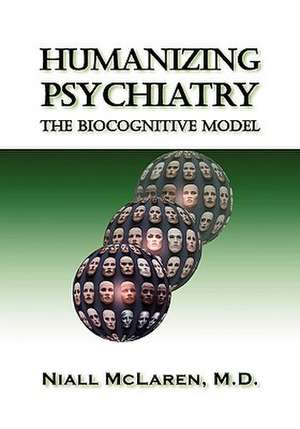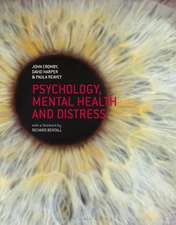Humanizing Psychiatry: Avail. in Cloth
Autor Niall McLarenen Limba Engleză Paperback – 27 sep 2009
Assailed from many directions, under constant attack for its reliance on "a drug for all problems" and increasingly unableto attract bright new trainees, the specialty is showing every sign of terminal decline. The reason is simple: modern psychiatry has no formal model of mental disorder to guide its daily practice, teaching and research. Unfortunately, the orthodox psychiatrists who control this most conservative profession are utterlyantagonistic to criticism. Despite the evidence, they maintain a blind faith that "science will deliver the goods" by a biological examination of the brain.This book argues that their faith is entirely misplaced and is contributing to the destruction of an essential part of civilized life, the fair and equitable treatment of people with mental disorders. The author offers a rational model of mental disorder within the framework of a molecular resolution of the mind-body problem. Fully developed, this model will have revolutionary consequences for psychiatry--and the mentally-afflicted.
Acclaim for the writing of Niall Mclaren, M.D.
"This book is a tour de force. It demonstrates a tremendous amount of erudition,intelligence and application in the writer. It advances an interesting and plausiblemechanism for many forms of human distress. It is an important work thatdeserves to take its place among the classics in books about psychiatry."
--Robert Rich, PhD, AnxietyAndDepression-Help.com
"Dr. McLaren brilliantly wields the sword of philosophy to refute the moderntheories of psychiatry with an analysis that is sharp and deadly. His own proposednovel theory could be the dawn of a new revolution in the medicine ofmental illness."
--Andrew R. Kaufman, MD, Chief Resident of Emergency Psychiatry, Duke University Medical Center
"I found Niall McLaren's book to be an incredibly well-written and thoughtprovoking.It is not, by any means, easy reading. It is also not for someonewho doesn't have some form of background in understanding the variouspsychological theories and mental health conditions. I think that this wouldmake an excellent textbook for a graduate class that allows students toquestion the theories that we already have."
--Paige Lovitt for Reader Views
About the Author
The author is a psychiatrist of some 35 years standing. He writes philosophyin the bush outside Darwin, northern Australia, with his family as critics. Forsix years, while working in Western Australia, he was the world's most isolatedpsychiatrist.
For more information please visit www.FuturePsychiatry.com
PSY018000 Psychology : Mental Illness
MED105000 Medical : Psychiatry - General
PHI015000 Philosophy : Mind & Body
Preț: 137.54 lei
Nou
Puncte Express: 206
Preț estimativ în valută:
26.32€ • 28.14$ • 21.94£
26.32€ • 28.14$ • 21.94£
Carte disponibilă
Livrare economică 28 martie-11 aprilie
Preluare comenzi: 021 569.72.76
Specificații
ISBN-13: 9781615990115
ISBN-10: 1615990119
Pagini: 240
Dimensiuni: 178 x 254 x 13 mm
Greutate: 0.42 kg
Ediția:New.
Editura: Future Psychiatry Press
Seria Avail. in Cloth
ISBN-10: 1615990119
Pagini: 240
Dimensiuni: 178 x 254 x 13 mm
Greutate: 0.42 kg
Ediția:New.
Editura: Future Psychiatry Press
Seria Avail. in Cloth
Descriere
Modern psychiatry has no formal model of mental disorder to guide its daily practice, teaching and research. McLaren offers a rational model of mental disorder within the framework of a molecular resolution of the mind-body problem. This model will have revolutionary consequences for psychiatry--and the mentally afflicted.
Notă biografică
Niall McLaren is an Australian psychiatrist, author and critic. He was born and educated in rural Western Australia, graduating in medicine at the University of WA in Perth in 1970. He completed his postgraduate training in psychiatry in 1977 and subsequently worked in prisons and then in the Veterans' Hospital, with a year's break working in the far southern region of Thailand. From 1983-87, he studied philosophy in order to undertake a PhD jointly in psychiatry and philosophy of science. In 1987, he left Perth city to travel to the remote Kimberley Region of Western Australia as the region's first psychiatrist. As a psychiatrist with no staff, no hospital beds, no clinic and not even an office, nearly 2000km from the nearest psychiatrist, he was the world's most isolated psychiatrist. While there, he continued studying and writing and began publishing work highly critical of mainstream psychiatry. After six years in the bush, he moved to Darwin, the capital of Australia's Northern Territory, first as chief psychiatrist for the Top End, then in private practice, where he was closely involved with the large military population. He has since moved to Brisbane, in Queensland, and is emphatic that there will be no more moves. His work is highly original and he does not admit to any intellectual debt to psychiatrists, living or dead. When he graduated in psychiatry, he was aware that the field was not what it claimed to be. It was clear that psychiatrists routinely made major claims on the nature of mind and of mental disorder that were not justified in the literature and, he intuited, could never be justified. This led him to the philosophy of science which established that psychiatry lacked a formal model of mental disorder. In turn, this problem arose just because it had no model of mind. As a result, modern psychiatry lacks a basis in any known concept of science. It is, in fact, at best a proto¬science and, at worst, crude and highly misleading pseudoscience. Almost invariably, his work provokes bitter antagonism from mainstream psychiatrists. Over the past forty years, orthodox psychiatry has committed itself totally to the reductionist biological approach to mental disorder, with no possible alternatives. Despite massive increases in expenditure on mental health, there is absolutely no evidence to support the oft-repeated claims that psychiatry is making great advances and people are better off than they have ever been. Every figure indicates that as psychiatry extends its reach, the mental health of the population declines. McLaren argues that this is just because psychiatry is not a science. Because it lacks a formal model of its field of study, mental disorder, psychiatry is perpetually at the mercy of social and political fads and fashions. He maintains that biological psychiatry is nothing more than a passing fad and must eventually go the way of psychoanalysis, behaviourism and possession theory. In the meantime, it is doing an immeasurable amount of damage. He recently published the results of a lifetime of work on a model of mind for psychiatry, the biocognitive model, which leads directly to a model of mental disorder. This is the first time in the history of psychiatry that such a model has been available. The present work, Narcisso-Fascism, was designed as a test of the biocognitive model by applying it to a completely unrelated field. What emerges is an entirely novel understanding of the politics of extremism which confirms what has often been said, "The fascist is within me," but also offers a means of controlling the phenomenon. Given the present state of world politics, this is definitely needed. Learn more at www.niallmclaren.com










